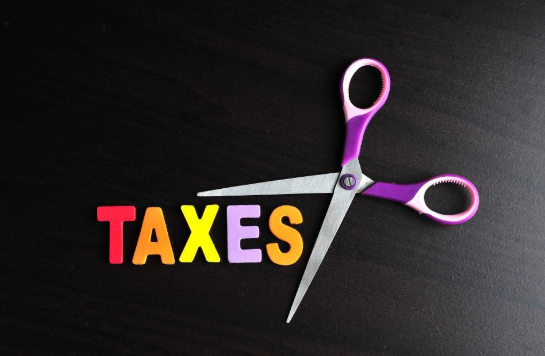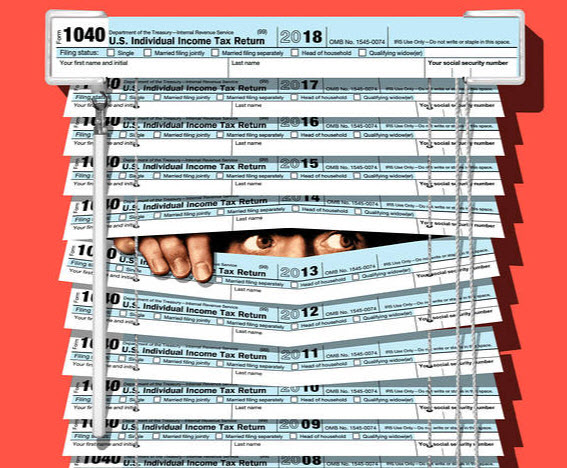When DIY Won't Do: 3 Times, When Hiring a Tax Relief Professional is the Only Way to Go
When it comes to your money, there’s only one person that truly has your best interests at heart - and that person is looking back at you in the mirror. Handling your own finances and making your own decisions can give you peace of mind and help you avoid a costly mistake.
There is a lot to be said for the do-it-yourself approach to your money, yet the go it alone path does have its limitations, especially when it comes to the IRS and back taxes.
We see clients that have tried to handle their taxes on their own, sometimes raising red flags with the IRS, resulting in audits, or getting hit with a big tax bill they can’t pay. They might setup an installment agreement on their own, but often times, the DIY approach just makes the penalties and interest keep stacking up putting in an endless loop of back taxes. Many of our clients started out by trying to do this on their own or with their current tax preparer.
Dealing with the IRS takes a very specialized skill set that most tax preparers and even CPA’s don’t possess. Make sure you have a tax resolution specialist on your side. Rarely can someone who is not a tax resolution specialist achieve the same results as someone who works in this field.
So, before you end up in that horror story, here are 3 times when hiring a tax pro or a tax relief firm like ours is the only way to go.
#1 You Just Received a Major Windfall
Even if you know how to handle your finances, receiving a major windfall can throw your plans for a loop. Whether you are the lucky holder of a winning lottery ticket or the recipient of a major inheritance, it pays to seek outside advice.
If you choose the DIY approach and make a mistake, you could end up paying more in taxes than you should, but a high tax bill is not the only danger. Handling your windfall the wrong way could throw off your asset allocation, impact financial aid for your college-bound children and create additional problems down the road.
#2 You Have Existing Tax Problems with the IRS
When you have issues with the IRS, you absolutely cannot afford to go it alone. Attempting to resolve tax issues on your own is unwise in the extreme, and a single slipup could leave you on the hook for even more. I mean, ask yourself if you would go before a judge in court without a lawyer representing you? Probably not. It’s the same here. Representing yourself before the IRS is generally not a good idea. Don’t do it. You most likely will get “creamed”!
If you receive a notice from the IRS, time is of the essence, but you should not let the desire for fast action override the need for professional help and guidance. If you want to resolve your issues fairly without going broke, do yourself a favor and find the right tax resolution firm. Hiring an enrolled agent, CPA or an attorney who is trained in tax relief is the best way to preserve your rights. You do not want to go it alone.
#3 When You Have Assets You Need to Protect
When you owe taxes, the IRS only cares about one thing, and that is to get paid what they think you owe them.
They’ll levy your bank account, emptying everything you have in there. If you run a business, that means you won't be able to pay your employees, pay your office rent or keep your lights on, ultimately putting you out of business.
They’ll also garnish your paycheck leaving you about 10% to 25% of your net pay to live on. Good luck with that.
They can also put a lien on your assets, including real estate, personal property and financial assets. This puts in jeopardy everything you’ve worked so hard to attain.
Hiring the right tax relief professional can help you avoid such extreme measures taken by the IRS. They’ll communicate with the IRS on your behalf and can often remove a lien or levy. If you have assets you can’t afford to lose, then hiring a tax relief pro is the only way to go.
The Bottom Line
Even if you are confident in your DIY approach or feel your tax problem isn’t so serious, it never hurts to get a second opinion. If you are doing everything right, that tax resolution specialist’s advice will give you peace of mind. If there are deficiencies in your actions, the advice you get could stop you from making a devastating, and possibly irreversible, mistake.
If you do run into tax trouble, reach out to our tax resolution firm and we’ll schedule a free, no-obligation confidential consultation to explain your options in full to permanently resolve your tax problem. Visit us at www.elitetaxrelief.com or CALL NOW! (479) 242-7499.
What is Currently Not Collectible Status from The IRS?
Big companies are known for getting all sorts of breaks, but when average people fall behind, they rarely receive help. When you owe back taxes, but can’t afford to pay them, then you may qualify for a special tax status known as currently not collectable.
If you’re approved for currently not collectable status, then the IRS must not only cease its collection efforts but can no longer garnish your wages or seize your property.
Want to know if you qualify for currently not collectable status? Contact our firm here for a specific evaluation of your situation. Call (479) 242-7499.
What is Currently Not Collectible Status?
If the IRS agrees you can’t both pay your back taxes and cover your reasonable living expenses, it may place your account in Currently Not Collectible status. It’s based on your current financial situation.
You can request currently not collectible status by submitting the proper form and proof to the IRS of your income and expenses, as well as whether you can sell any assets you may have or get a loan.
As you’ll need to be able to document your inability to pay, be sure to gather copies of all your bills, your most recent paycheck stubs, and statements detailing other sources of income such as alimony, pensions or investments. If the IRS determines that your necessary expenses exceed your income, then it will notify you of your Currently Not Collectable status
WARNING: Don’t try to do this alone. We recommend reaching out to our tax resolution firm to guide you through your options. Talking to the IRS directly could be like shooting yourself in the foot. They’ll ask you very invasive questions that could land you in deeper trouble. Remember, the IRS is not your friend. Their job is to collect what they believe you owe them, so it’s best to have a professional in your corner.
Not a Permanent Solution
Keep in mind that currently not collectible status applies only to your back taxes. You will still have to file tax returns, and you will not be exempted from paying current and future taxes. You will also continue to accumulate penalties and interest on your unpaid taxes. After a year or two, the IRS may review your status, and if you’re able to begin paying your back taxes, then you must do so. If you’re still not able to pay, then your status will be renewed.
Statute of Limitations
The IRS can attempt to collect outstanding taxes for only 10 years from the date the taxes were assessed against you, usually, that’s the date you filed. If at the end of this 10-year period the IRS hasn’t collected, then the taxes are no longer owed.
In difficult times, many families have trouble meeting their commitments. If you’re worried about the IRS garnishing your wages, levying your bank account or taking your home, then reaching out to our firm and getting a free, no-obligation, confidential consultation on your tax problem may give you some peace of mind. If you’re not approved for Currently Not Collectible status, our firm will discuss the many other tax relief options with you. Contact us now at www.elitetaxrelief.com or (479) 242-7499.
4 Mistakes That You Don't Want to Make When Filing Your Taxes. (They Could Land You In Tax Trouble)
It can be a stressful experience preparing your taxes and filing them. It can be even more stressful however, if you make these mistakes that land you into tax trouble. It's important to remember that if you make mistakes that are serious enough, you might end up triggering an audit of your tax return or owe more in back taxes.
It’s early to be talking about tax season, but if you're planning on filing your own taxes this year, here are four mistakes that you should avoid.
Don't neglect to report all your income
Whatever your sources of income may be, whether it's your regular paycheck, a side gig, gains that you've made on the stock market, or interest that you've earned from deposits in the bank, it's important to remember that you should account for all of it in your tax return. If you don't, the IRS may come looking for it.
Every time you make at least $600 in income working as an employee of any description, you’ll get a 1099 form stating what you've made. The IRS gets a copy of the form, as well. This means that it makes no sense to try to hide your income from the IRS.
When you make any kind of income, you should report it on your tax return. Technically, you should even record smaller chunks of income, the kind for which you don't get 1099 forms.
Don't just guess at what your deductions are
There are many possible tax deductions that you could take advantage of. It's important to remember, however, that you do need to back up every attempt at a deduction with documentary proof like receipts or logs. If you attempt a rough estimate at what your deductions should be, you could trigger suspicion, especially if the sum that you claim is high for your income level, or if it is a convenient round figure.
Don't automatically reject the idea of itemizing
Most tax filers choose to take the standard deduction, rather than itemize. This doesn't mean that you shouldn't itemize. It depends on your specific circumstances. If you have many legitimate deductions to make, say, because, you pay a great deal of mortgage interest, you might be better off itemizing, even if it takes more work to do it.
Don't put off filing
Preparing your taxes is a complex process. If you're self-employed, or if you need to itemize, it can only get worse. It's important to not rush through the process. Any mistakes that you make may prove costly. Take out the time to file your taxes well ahead of the tax deadline. If you need extra time, you can always file for an extension. This way, you can avoid the late filing penalty, which can add up to a whopping 25% of the original tax amount
Making a mistake on your tax return is the last thing you want to do. Mistakes can be complicated to correct and recover from. It's important to give yourself enough time.
Whatever you do, don’t skip filing. Many clients come to us with not only years of unfiled tax returns but owing large sums of money to the IRS. Many times we can help you obtain a “fresh start’ settlement for up to 85% (or more) off the original amount owed, including penalties and interest, if you qualify.
If you do run into tax trouble, reach out to our tax resolution firm and we’ll schedule a free, no-obligation confidential consultation to explain your options in full to permanently resolve your tax problem. Visit us at www.elitetaxrelief.com or call (479) 242-7499.
8 Reasons to Work with a Tax Resolution Professional To Resolve Your Back Taxes
When you owe money to the IRS, it is hard to think about anything else. While being in debt is never fun, no matter who the creditor is, the IRS enjoys almost unlimited power to collect the money they are due.
Unlike your mortgage lender or credit card company, the Internal Revenue Service has the power to attach your wages, raid your bank account and even take your freedom. No other creditor even comes close in terms of its power and influence and taking on the agency on your own could be asking for trouble.
If you have received a notice from the IRS, you need to act fast, and you need the right assistance in your corner. Taking on the IRS requires specific expertise, and that is why it is so important to work with a quality tax resolution company. Here are eight reasons why working with a tax resolution service could save your good name - and your bank account.
- You gain specific expertise. The IRS is a specialized agency, and you need expert advice and guidance to get the most positive resolution.
- It will give you peace of mind. Just being contacted by the IRS can make your heart beat a bit faster, but working with a tax resolution expert can set your mind at ease. Generally, once you hire a tax resolution expert you won’t have to meet or speak with the IRS.
- The tax resolution process could save you a lot of money. Tax resolution agents are experts at settlements, and working with one could save you a ton of money.
- Timely action could save your home and property. If you wait too long, you could put your home, business, bank accounts and personal property at risk. Time is of the essence when it comes to resolving tax issues, and timely assistance could make a world of difference.
- You will feel less alone. Few things feel as lonely as fighting the IRS on your own. When you work with a tax resolution expert, not only do you not have to go it alone but they actually step into your shoes to represent your best interests.
- You will have a chance to file missing returns. When faced with a big tax bill, it is easy to do nothing, but failing to file tax returns could have serious consequences down the line. If you have years of unfiled returns, a tax resolution expert can help you catch up.
- Expert help could make an audit less scary. Receiving that audit notice in the mail can be frightening, but a tax resolution expert can guide you through the process. When you work with a tax resolution professional, you will have one less thing to worry about.
- You could save your credit score. Unresolved issues with the IRS will reflect badly on your credit report, lowering your credit score and making it harder to borrow money or qualify for a mortgage. Timely tax resolution could preserve your stellar credit score and help you avoid those serious consequences.
Owing money to the IRS can be very frightening. There is a reason those three letters strike so much fear into the hearts of ordinary citizens, even those who have done nothing wrong.
If you are in trouble with the IRS, you cannot afford to ignore the issue, so act fast and get the help you need today. Working with a tax resolution expert carries a host of benefits, starting with the eight outlined above.
Reach out to our firm and we’ll schedule a no-obligation confidential consultation to explain your options in full to permanently resolve your tax problem. Visit us at www.elitetaxrelief.com or call (479) 242-7499 Now!
Why Early Adopters of Cryptocurrency Should Explore Their Tax Resolution Options Now
The stunning rise in the value of Bitcoin, along with the myriad of cryptocurrencies, is surely one of the biggest financial stories of the 21st century, at least so far. What started out as a mere curiosity and niche project for programmers and geeks has quickly blossomed into a full-fledged financial asset, and an increasingly popular one at that.
For early adopters, the financial returns have been simply mind-boggling. You may have heard about the generation of Bitcoin millionaires, and there are plenty of those newly rich investors to go around.
Given the rapid rise and relative anonymity of Bitcoin transactions, it was only a matter of time before the IRS caught on, and the tax agency has caught on – and caught up – in a big way. After years of taking a hands-off approach to cryptocurrency investments, the IRS is now paying close attention – and requesting the real-world identities of those supposedly anonymous buyers and sellers.
While every investor in cryptocurrency should be aware of their potential tax liability, the problem could be even more acute for early adopters – the very investors who have profited the most from this unique form of digital payment.
As with all things tax, the Internal Revenue Service is likely to start where the big money is, and the tax agency has increasingly set their sights on early adopters. If you were prescient enough to buy into the promise of Bitcoin and other cryptocurrencies when everyone else was looking the other way, it may be time to settle up with the IRS.
For early adopters of cryptocurrencies like Bitcoin, a little proactivity could go a long way. The IRS has already requested records from Coinbase and other big cryptocurrency exchanges, and it is only a matter of time before they catch up to you and your profits.
For now, the tax agency claims it has requested information on only the largest accounts, but it is reasonable to assume the IRS will expand its scope in the future. If you have booked your Bitcoin profits and want to settle up with the IRS, contacting a tax resolution agency now could save you a lot of money – and potentially a lot of grief.
There are many reasons for early adopters of Bitcoin and other cryptocurrencies to work with a tax resolution service, starting with the complexity of reporting profits in digital currency. The IRS is still fairly new to regulating and taxing cryptocurrency, and there has been a lot of confusion and misinformation over how profits are taxed and how people are supposed to pay.
Regardless, if you haven’t reported your crypto earnings or filed your taxes for the past few years, it’s time to do so now. By working with a tax resolution expert, you will gain access to a world of expertise, so you can draw on that knowledge to accurately report how much cryptocurrency you have purchased, how many coins you have used and how much you have gained or lost on each transaction.
This accounting is very important since it could impact not only your tax bill but any future taxes and penalties. According to the IRS, holders and users of cryptocurrencies have been responsible for reporting their gains all along, and failing to do so could mean big penalties and lots of back interest.
A tax resolution specialist will be able to guide you through what is surely one of the most complicated tax situations in many years. The very complexity of the cryptocurrency market makes navigating the tax consequences especially difficult, and it never hurts to have some expert assistance in your corner. So do yourself a favor and come clean now – the IRS has finally caught on to the cryptocurrency revolution, and the tax agency is making up for lost time and making the lives of early adopters a lot more difficult.
If you want an expert tax resolution professional who knows how to navigate the IRS maze, reach out to our firm and we’ll schedule a no-obligation confidential consultation to explain your options to permanently resolve your tax problem. Contact us at (479) 242-7499 or visit www.elitetaxrelief.com.
3 Reasons You Shouldn’t Talk To The IRS Yourself If You Owe Back Taxes
If you owe money to the IRS, it might sound like common sense to try to tackle your tax problem on your own. However, one of the worst things you could do is talk to the IRS directly without proper representation.
As an expert Tax Resolution Firm, we encourage all readers facing a tax problem to contact us for a free consultation.
The IRS is not on your side and their primary goal is to collect the taxes they believe you owe. In this article, we give you 3 reasons why talking to the IRS directly could get you into deeper trouble.
1. You Have Rights
Contrary to popular belief, you DO have rights as a taxpayer you probably don’t even know exists. One of those rights is the right to representation. If an IRS revenue officer or revenue agent calls or “visits” you, did you know you are under no obligation to answer any of their (very intrusive and condescending) questions? You politely respond by asking for their contact information and telling them you are in the process of hiring a professional to represent you and that this person will contact them directly. A CPA or Enrolled Agent (EA) that deals with IRS problems for a living knows the “ins” and “outs” and how to deal with the IRS so that your rights are protected. A tax resolution specialist also knows how to get you the lowest possible settlement allowed by law. Generally, our clients never meet or speak with the IRS once we’re on the scene!
2. Answering Questions Can Dig You Into A Deeper Hole
If you are being audited or about to be - The IRS will ask you about 50 very intrusive questions in the initial interview with them. How you answer these questions will dictate the fate of your case. Having a tax resolution specialist conduct these meetings, WITHOUT you is the best course of action I can recommend. Half of the referrals to the IRS’s criminal investigation division (CID) come from that “nice” auditorl you’re sitting across the table from at the audit.
3. They won’t tell you about all the settlement programs and options you have. The just want their money.
If you owe between $10,000 and $25,000 plus, the IRS has many NEW flexible programs, under their Fresh Start Initiative, available to taxpayers such as Offer in Compromise, Partial Pay Installment Agreements, Payment Plans, Penalty Reduction, and Currently Not Collectible Status to name a few. Each carries with it its own unique process, procedures and qualifications. Having an experienced Tax Pro in your corner ensures you are taking advantage of the best options available to you.
One last thing….
Ask yourself this question: Would you go to court without a lawyer?
If you answered “yes” hopefully you know the law inside and out concerning your case, but if representing yourself doesn’t seem like a great idea it’s best to hire somebody who is well versed in the subject matter. Well, it’s the same thing with the IRS. Having someone who knows how to negotiate the IRS’s maze of rules, regulations and the 74,000 pages of the Tax Code and deal with the IRS may be the best money you’ve ever spent!
If you want the help of an expert tax resolution professional who navigates the IRS maze for a living, reach out to our firm and we’ll schedule a no-obligation confidential consultation to explain your options to permanently resolve your tax problem.
Top 10 IRS Audit Red Flags
No one wants to pay more income taxes than they are required to, but be careful if you do your own taxes. Attempting to cut your tax liability by getting into IRS grey areas can cause you problems later on. You don’t have to do anything unethical to get your return pulled for an audit, you just have to raise too many of these red flags. If you’re in the middle of an audit or owe back taxes, contact us to schedule a free confidential consultation at 479-242-7499.
1. Making too much money. Sounds like a problem everyone would like to have, but making over $200,000 may make you more likely to be audited. The fact is that there are fewer auditors, so the IRS is focusing on where they can make the most bang for the buck.
2. Not reporting all your income. No matter how much or little you make, report everything. In some way or another, unless you run a strictly cash business (another red flag), all of your income is reported to the IRS. W2, 1099 and other forms you receive are duplicated and sent in to the IRS. If your reported income doesn’t match what was reported to the IRS, that’s one more red flag.
3. Math errors. Whether you file electronically or still file paper forms, your information gets entered into a computer. And one thing computers are very good at is doing the math. If things don’t add up, or there was an honest mistake inputting the information, it can raise a red flag. A math error won’t necessarily get you an audit, but it will get the attention you may not want. Make sure to double check your returns and have a qualified tax professional assist you and keepyou out of tax trouble.
4. Home businesses that never make money. Sole proprietorships that file a Schedule C year after year and always show a losswill raise a red flag. Even if you show a profit, but the profit margin isalways unreasonably small, that will get the IRS’ attention.
5. Large charitable deductions.
There is nothing wrong with being charitable and there is no legal limit to how
much of your hard-earned cash you can give away, but if your donation is out of sync with the norm, that’s another red flag.
6. Overstating business expenses. Depending on the type of job you have, there can be many legitimate expenses that your employer doesn’t reimburse you for. If you’re a business, you might be tempted to write off just a little extra. These mightbe genuine deductions. But don’t try to deductsomething that’s not on the approved list and don’t claim deductions wayoutside the norm. Check with your tax professional and stay up to datewith tax laws so you’re not padding your tax return with write offs.
7. Sketchy real estate rental revenue or losses. Some people will ‘rent’ their property to friends or family at well below market value and then claim normal rental business expenses. As with other areas, the IRS compares what you claim against local standards to determine if this is a legit business. If not, they will disallow the deductions.
8. Home office deductions.
There are absolutely legitimate home office deductions, but the IRS has very
strict guidelines on what you can claim and how much. Try to claim too much and
this is a classic red flag.
9. Claiming losses for things that aren’t deductible or deductible in your circumstances. One example is claiming day-trading losses on a Schedule C. If you dabble in stock trading and take a loss, it may or may not be deductible, but almost certainly doesn’t qualify for a Schedule C loss. You also can’t take a deduction for alimony. The IRS maintains a list of non-deductible expenses, make sure to check that and check with your tax professional.
10. Claiming 100% business use of your vehicle. If you spend most of the time in your vehicle doing your job, you may think it’s easier just to claim the whole thing for business. Wrong. You will either haveto show your personal use, no matter how small, or show you have a secondvehicle for personal use.
Many of these items are red flags for an audit, but many are also legitimate deductions. The key is to have a qualified tax professional on your side, especially someone who is well experienced in tax resolution and can help you minimize the risk of an audit and the resulting tax problems down the road. At the very least, keep meticulous records and make sure you are inside the guidelines of the IRS. If you need an expert tax resolution professional who knows how to navigate the IRS maze, reach out to our firm and we’ll schedule a no-obligation confidential consultation to explain your options to permanently resolve your tax problem. Visit our website at www.elitetaxrelief.com or call 479-242-7499 Today.

If You Don't Have Money to Pay Your Taxes, You Have Legitimate Options
If you don't have money to pay what you owe the IRS, you have a few options to work with. Whatever you do, don’t ignore the letters from the IRS and don’t let your back-tax problem go unattended. The IRS has a great deal of power when it comes to recovering money they think is theirs.
When you owe the IRS money, they can garnish your wages, levy your bank accounts, put a lien on your home and seize other assets.
Here's what you can do if you find yourself unable to pay your taxes. Note, we always recommend getting in touchwith a specialized tax resolution professional to help avoid the harsh penalties and interest that accrued on your back taxes. It’s far easier to navigate towards tax resolution, if you have a professional working with you. If you’d like to schedule a no-cost confidential tax relief consultation, contact us at www.elitetaxrelief.com or call 479-242-7499.
First, make sure that you file your returns
Even if you have no hope of being able to pay your taxes, you should at least file your income tax returns. Whatever the penalties are for not paying your taxes, the penalties for not filing are much larger. The IRS will remove penalties for not filing and not paying but you must have a good reason. We can request to have your penalties removed or reduced. It's also important to remember that when you file for an extension, it only gives you more time to file. Your payment date remains unchanged.
Revisit your W-4 withholdings
If your employer withholds money from your salary to pay your taxes with, you shouldn't have to worry about paying anything extra from that income source. If you do owe more, it's a sign that your withholding exemptions are incorrectly reported on your W-4 form. To make sure that you don't get into tax trouble repeatedly, you should make sure your W-4 form is correct and get advice from a tax professional about the amount of withholdings necessary.
Make a partial payment
If you can't afford to pay all that you owe, you should pay whatever you can. While you will still be hit with interest and penalty charges, they will be smaller than they would be if you paid nothing. These charges are proportional to what you owe the IRS.
Try to work with the IRS
If you can't pay, there are resolution options available to you if you qualify for them.They include a payment plan or an offer in compromise to name two. You need to first step up and admit to your inability to pay, though.
When the IRS grants you a payment plan, you get to pay your back taxes in installments each month. Applying for a payment plan is easy if you owe less than $10,000 - you simply need to fill out the form online. It can be more difficult to get the IRS to accept a monthly payment plan if you owe $10,000 to $50,000. If you owe more than $50,000, you need to complete IRS form 433-A. Generally, once you hit the $50,000 threshold it’s advisable that you hire the services of a competent experienced tax professional. If your repayment plan is approved, they can give you up to 72 months to finish paying. You need to pay interest and processing fees for the plan, though.
If your financial hardship is serious enough to preclude the possibility of repayment in the future, the IRS has a program called the Offer in Compromise. You need to prove to the IRS that you will never be able to pay the full amount back even over time.
Contact us if you’d like assistance in resolving your tax problem. Schedule a free confidential consultation at www.elitetaxrelief.com or call 479-242-7499.
Be sure to not fall for false promises
Scammy so called tax professionals and other con artists know how desperate things can get for people who are unable to afford their taxes. They sometimes advertise on television and radio, promising to negotiate with the IRS to bring your taxes down in return for a large fee without first seeing which IRS programs you are eligible for. You should be very careful before engaging these types of companies. Going to a local, experienced tax resolution professional may be in your best interest.
If you need an expert tax resolution provider who knows how to navigate the IRS maze, reach out to our firm and we’ll schedule a no-obligation confidential consultation to explain your options to permanently resolve your tax problem.
A Taxing Situation: Timely Tax Tips for Cryptocurrency Investors
Until recently, cryptocurrency investors have mostly flown under the radar as far as taxes are concerned. Now those days are coming to an end, and many holders of virtual currency are scrambling to understand what they owe and how their investments may impact their finances.
The IRS has already requested the identities of those who hold substantial amounts of cryptocurrency, and it is only a matter of time until the tax agency broadens its scope. Just as with overseas bank accounts, the days of free riding in the cryptocurrency market are quickly coming to an end.
When the veil of secrecy got pierced for holders of Swiss bank accounts, wealthy individuals all over the world were shocked -- and suddenly a lot poorer. And while cryptocurrency fans have primarily relied on the supposed anonymity of their investments to protect themselves, recent events have shown that Bitcoin, Ethereum and the like are not entirely as anonymous as advertised. So, before the tax man comes calling, it is time to get out ahead of the situation.
Here are some timely tax tips for cryptocurrency investors but before we get into it, if you need an expert tax advisor or are already in tax trouble, reach out to our firm and we’ll schedule a confidential consultation. Call 479-242-7499.
Do Not Assume Your Account is Too Small
If you only have a few hundred dollars in the cryptocurrency market, you may assume that your account is too small to get the attention of the IRS, but that is not necessarily the case. As the tax agency gets better at sorting out the records of cryptocurrency exchanges, they will likely expand their reach beyond the most significant players in the marketplace.
As the reach of the tax agency broadens, more and more cryptocurrency investors will become ensnared in their net. Keep in mind that much of this information gathering is automated and that the IRS may begin to generate statements on that basis.
Know that All Cryptocurrencies Will Be Impacted Eventually
While Bitcoin is the first, and by far the most significant cryptocurrency tax target, eventually the IRS will start poking around in other forms of virtual payment. Even if you have eschewed Bitcoin in favor of other cryptocurrencies, you should not expect a free ride from the IRS.
In fact, certain altcoins may garner considerably more IRS scrutiny, especially forms of payment associated with drug purchases and other transactions on the dark web. Even if you are not doing anything wrong, your holdings in those altcoins could get the attention of the IRS and eventually generate a big tax bill.
Keep Careful Records
The tax man is coming eventually, and the best thing you can do is prepare now. Waiting until the IRS comes calling could mean big penalties and additional interest, so the best strategy is to calculate your holdings and determine what you might owe.
Keeping extensive and accurate records will be essential going forward, but you might want to go back and look at your past purchases and sales. Every transaction, including purchases using cryptocurrency as payment, could potentially be a taxable event, so good recordkeeping is vital.
The IRS is interested primarily in the money you make on cryptocurrency, not necessarily on how many virtual coins you own. Calculating the cost basis, i.e., what you paid for the coins in the first place, can help you avoid paying too much in taxes while keeping you on the right side of the IRS.
Watch Out for Scams
The fact that cryptocurrency is in the IRS crosshairs has taxpayers worried. Unfortunately, the new tax scrutiny has also given rise to many scams, and it is essential for investors to prepare for the possibility.
These tax scams are likely to follow a familiar scenario, albeit with a cryptocurrency twist. The scam artist may call holders of cryptocurrency, claiming to be from the IRS and demanding immediate payment for taxes owed.
While the tax agency has taken a new interest in cryptocurrency investments, they do not initiate collection activities over the phone or via email. If you do owe money on your cryptocurrency holdings, you will receive a letter from the IRS, and possibly a bill as well. If you receive a threatening phone call or suspicious email, ignore it - or report it to the authorities and the IRS.
The cryptocurrency market is growing up, and the IRS has finally taken notice. After many years of flying under the radar, cryptocurrency investors are finally getting the attention of the IRS. Whether you were an early adopter or recently joined the virtual payment revolution, you need to prepare for the tax implications of this 21st-century investment. The sooner you get started, the less taxing the situation will become.
If you need an expert tax advisor or are already in tax trouble, reach out to our firm and we’ll schedule a confidential consultation. Call 479-242-7499 TODAY.
What are the Chances that your Income Tax Return will be Audited?
For the vast majority of taxpayers, there is not much need to worry that you will be audited. In 2016, only 0.6% of individual income tax returns were audited according to the IRS 2017 Data Book. Why? For starters, the IRS budget has been cut resulting in more than 2,200 fewer agents available to audit returns. However, the “real” audit rate is closer to 7.o% as the IRS does not include the over 9.2 million notices that are questioning items on your client’s tax returns such as forgetting to include a 1099-Misc form. The IRS is relying more and more on technology to uncover underreporting and underpayment of taxes. Also, certain taxpayer groups are more susceptible to catching the attention of auditors.
If you’re in the middle of an audit or owe back taxes, contact us to schedule a free consultation. Visit www.elitetaxrelief.com or call 479-242-7499.
Returns that report more than $10 million in income or report no income
Sixteen percent of individuals who reported over $10 million in income were audited in 2014. Surprisingly, those returns that reported no income were audited at a higher rate than the average person. In 2014, 5.3% of tax returns with no income reported were audited. If your income is $25,000 - $200,000, you're highly unlikely to be singled out for an audit.
Estate Tax Returns of more than $5 million
In 2014 the IRS did an audit on 8.5% of estate tax returns which was well above the .9% of individual returns. Even larger estate tax returns, 21% of those between $5 million to $10 million were audited, while 27% of those over $10 million received an audit.
Individual filing of international returns raises a red flag
The IRS is focusing more attention on international returns. Statements made by experts in the field, strongly emphasized the practice of offshore tax evasion as being fundamentally unfair. Wealthy people evading the law by stashing their money overseas and not paying their share of tax is forcing the bulk of lower income citizens to foot the bill to fund the government. In 2014 only 4.8% of the international returns were audited.
Errors in information entered
Simple careless mistakes in filling out income tax forms send up red flags to the tax auditors. Filers neglect to get all report forms and statements together and forget to report dependents and exemptions correctly. The automated systems recognize these discrepancies but can't tell if they are actual mistakes or intentional. Neglecting to report all your income and other information could result in an audit, especially at higher incomes. Those who contribute to more charities and other organizations open up the possibility for fraud.
Reports of itemized deductions that are unrealistic
If an individual or small business claims itemized deductions that are clearly out of line, they could be signaled out for an audit. Filers need to know what a legitimate deduction entails.
Carefully reading directions for completing forms and checking for accuracy and honesty will reduce the chances of an audit. Hiring a tax professional, specifically someone with tax resolution experience like our firm, can help you stay out of tax trouble.
If you need an expert tax resolution professional who knows how to navigate the IRS maze, reach out to our firm and we’ll schedule a no-obligation confidential consultation to explain your options to permanently resolve your tax problem. Visit us at www.elitetaxrelief.com or call 479-242-7499.









